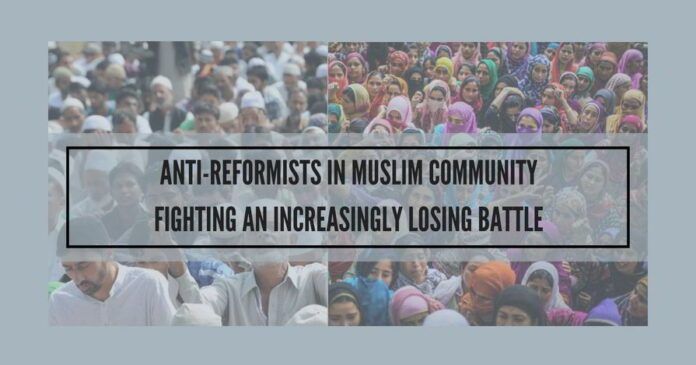
Gender justice activists from among the Muslim community are now more vocal than ever and have taken the fight to the Supreme Court.
It’s not surprising that the All India Muslim Personal Law Board (AIMPLB) has welcomed the Law Commission of India’s opinion that there isn’t the need to have a uniform civil code at this stage. But it’s also not surprising that the AIMPLB has opposed the law panel’s suggestion that some of the existing personal laws needed to be tweaked and codified to enhance gender justice. The Board thrives on the powers of discrimination that exist in the Muslim personal laws and is loathe to give them up.
Over the decades, our policymakers also could not summon the political courage to realize the spirit of Article 44.
It’s not that the Law Commission has targeted only Muslim personal laws. It has suggested changes in the Special Marriage Act to encourage inter-community marriages; reduction in the legal age of marriage for men to 18 years; changes in the Indian Succession Act to allow children born out of wedlock the right to inherit the self-acquired property of their parents. These suggested changes will impact communities across religious lines. But the focus of public discussion will remain on the aspects that concern, or are said to concern, Muslim personal laws, for obvious reasons.
It is unlikely that the Hindu community will take offense at the broad-based recommendations. It has been by and large open to reforms. Even in the 1950s, when the Hindu Code Bills were framed, there was dissent on religious grounds only among the fringe. If there was opposition to the move in the mainstream, it was not to the changes but to the fact that while the Hindu personal laws were codified, the framers of the Constitution did not deal similarly with Muslim personal laws. Instead, by way of compromise, the need for a uniform civil code that would do away with the Muslim personal laws was inserted in the Directive Principles of State Policy. The relevant Article 44 read: “The state shall endeavor to secure for citizens a uniform civil code throughout the territory of India.”
But the anti-reform lobby among the Muslim population has not allowed such an endeavor. Over the decades, our policymakers also could not summon the political courage to realize the spirit of Article 44. That’s how things stand now, with the only difference being that gender justice activists from among the Muslim community are now more vocal than ever, and have taken the fight to the Supreme Court. This has rattled the group which had so far protected its turf of prejudice against women. The first major blow it received in recent months is the apex court’s verdict which rendered instant triple divorce of Muslim women as unconstitutional, leading the Union Government to frame a legislation (which is yet to be endorsed into law, as a result of opposition from the Government’s rivals in Parliament) to criminalise the practice.
The second challenge the anti-reformists face is the clutch of cases in the court against Nikah Halala and polygamy. It must be remembered that, like with instant triple divorce, these two practices too have been held by many hardline Muslim clerics as an integral part of personal laws which are religion-centric. If both these instances too are struck down by the apex court, it will be a body blow to the anti-reformists. Besides, it will be established that neither Nikah Halala nor polygamy has anything to do with personal laws of the Muslim community.
Step by step, chip away at the discriminatory practices that prosper in the garb of Muslim personal laws. Both the executive and the judiciary have a role to play in making that happen.
The third challenge flows from the first two. If practices that the likes of AIMPLB have held for decades as intrinsic to Muslim personal laws which have the Constitution’s protection, can be set aside, it means that equality and gender justice which the Constitution ensures, reigns supreme over other laws, even if they are covered under the Muslim personal law. That should open the floodgates for Muslim women activists to more completely demand full equality in every manner. Naturally, these are danger signs for the clerics and their supporters within the community and outside, including the political arena.
The AIMPLB appears to have picked those signals. It realizes that even if the Law Commission of India has thumbed down a uniform civil code, it has suggested changes that will effectively dilute the potency of the personal laws out of which the community’s leaders derive their influence in society. Which is why, although the Board has welcomed the law panel’s remark that a uniform civil code was “not desirable at this stage”, it has made its displeasure clear over the reform measures suggested. Left to the AIMPLB, there is no ‘stage’ that can ever be ‘desirable’ to introduce a common civil code for all citizens of the country. The Board, which claims to represent the interests of the majority of Muslims — a claim that has come under intense scrutiny in recent months from reformists within the community — has bluntly said that it was not open to any reform through the legislative route in the personal laws of Muslims of India. It added that changes would come, if such changes were desirable, through social instruments.
Instant triple divorce did not go away through a social instrument; neither has polygamy or other similar gender-discriminatory practices. Since a uniform civil code appears to be on hold for now — in any case, even if the Union Government were to bring in a Bill for the purpose, it would find difficulty in getting the numbers in the Rajya Sabha to get it passed — the best alternative is that which the Law Commission has suggested. Step by step, chip away at the discriminatory practices that prosper in the garb of Muslim personal laws. Both the executive and the judiciary have a role to play in making that happen.
Note:
1. The views expressed here are those of the author and do not necessarily represent or reflect the views of PGurus.










